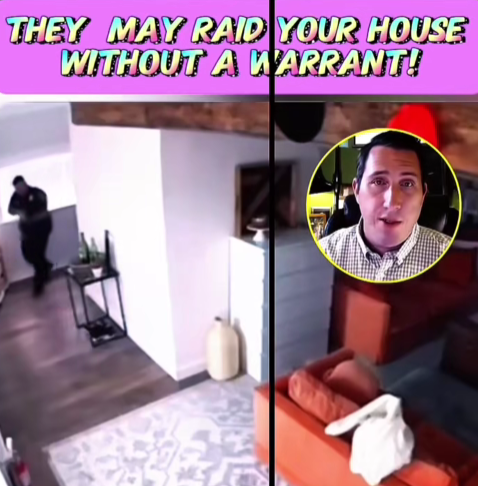A growing wave of concern is spreading after multiple reports and viral videos suggest that police may be entering homes without warrants, sparking fears of eroding civil liberties and violations of constitutional rights. Footage showing officers stepping inside residences without prior authorization has left citizens questioning just how protected their privacy really is under the law.
In one recent case, surveillance footage captured officers entering a home during what they described as an “urgent safety check.” The homeowner, who was not present at the time, later discovered the intrusion and took to social media to demand answers. The video quickly went viral, fueling outrage and raising important questions: under what circumstances, if any, can police enter a home without a warrant?
Legal experts explain that the Fourth Amendment to the U.S. Constitution protects citizens against unlawful searches and seizures, requiring a warrant signed by a judge for most entries. However, there are exceptions. Known as “exigent circumstances,” these allow officers to act without a warrant if they believe someone inside is in imminent danger, evidence is about to be destroyed, or a suspect may escape.
Critics argue that these exceptions are increasingly being stretched. “The problem is that ‘exigent circumstances’ has become a catch-all justification,” one civil rights attorney explained. “Too often, police claim urgency after the fact, even in situations where no true emergency existed.”
Public reaction has been intense, with many citizens alarmed at the possibility of officers entering homes under vague pretenses. “If they can just say it’s urgent and walk in, what’s the point of having constitutional rights?” one commenter asked online.
Supporters of law enforcement stress that warrantless entries can sometimes save lives. For example, in domestic violence cases or when responding to 911 calls, officers may not have time to wait for paperwork before acting. “The balance between protecting rights and protecting lives is delicate,” one former police chief explained. “But ignoring a genuine emergency could have tragic consequences.”
Nevertheless, watchdog groups warn that unchecked authority risks undermining trust in policing altogether. They are calling for stricter oversight, clearer definitions of what qualifies as “exigent circumstances,” and mandatory documentation whenever warrantless entry is made. “Transparency is the only way to ensure accountability,” one advocacy group declared.
The viral spread of these cases has already pushed some lawmakers to re-examine policies. Proposals include requiring bodycam footage of all warrantless entries, immediate judicial review after the fact, and stronger penalties for abuses of power.
For now, citizens are left with uneasy questions about the safety of their own homes. While the law technically provides protections, the gray areas of “exceptions” leave room for abuse—something more people are realizing could happen to them.
The debate ultimately cuts to the heart of democracy: how to balance law enforcement’s duty to act quickly in emergencies with the public’s fundamental right to privacy in their own homes.
